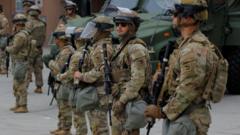In a unprecedented move, President Trump has mobilized thousands of National Guard troops and Marines in Los Angeles to counter protests against immigration raids. California officials are contesting this action, fearing it sets a dangerous precedent for democracy.
Tensions Escalate as National Guard Deploys to Los Angeles Amid Protests

Tensions Escalate as National Guard Deploys to Los Angeles Amid Protests
President Trump authorizes troop deployment in response to immigration-related unrest, raising concerns over civil liberties.
In a rare invocation of military force on U.S. soil, President Trump has deployed approximately 4,000 National Guard members and 700 Marines to Los Angeles in response to increasing protests surrounding immigration raids. This move has ignited fierce backlash from California officials, who argue that such military presence should be limited strictly to protecting federal property. Governor Gavin Newsom expressed deep concerns during a televised address, stating, “California may be first, but it clearly won’t end here. Other states are next. Democracy is next.”
The administration's actions have drawn significant scrutiny regarding their legality. Helene Cooper, a Pentagon correspondent, highlighted the traditional role of the National Guard in aiding local authorities during disasters, which typically requires cooperation with state governors. President Trump has defended the deployment, claiming, “If we didn’t get involved, right now Los Angeles would be burning,” an assertion that raises questions about the nature of the protests occurring in the city.
As these developments unfold, the legal boundary between state and federal authority has become a focal point. Experts argue that the use of active-duty troops for domestic law enforcement is prohibited unless the Insurrection Act is invoked, and the current protests, characterized as scattered and localized, do not equate to an insurrection.
In response to the unrest, Mayor Karen Bass implemented a curfew in downtown Los Angeles, coinciding with a surge of demonstrators gathering in cities nationwide. The situation remains fluid, with live updates being reported as tensions escalate.
The administration's actions have drawn significant scrutiny regarding their legality. Helene Cooper, a Pentagon correspondent, highlighted the traditional role of the National Guard in aiding local authorities during disasters, which typically requires cooperation with state governors. President Trump has defended the deployment, claiming, “If we didn’t get involved, right now Los Angeles would be burning,” an assertion that raises questions about the nature of the protests occurring in the city.
As these developments unfold, the legal boundary between state and federal authority has become a focal point. Experts argue that the use of active-duty troops for domestic law enforcement is prohibited unless the Insurrection Act is invoked, and the current protests, characterized as scattered and localized, do not equate to an insurrection.
In response to the unrest, Mayor Karen Bass implemented a curfew in downtown Los Angeles, coinciding with a surge of demonstrators gathering in cities nationwide. The situation remains fluid, with live updates being reported as tensions escalate.





















